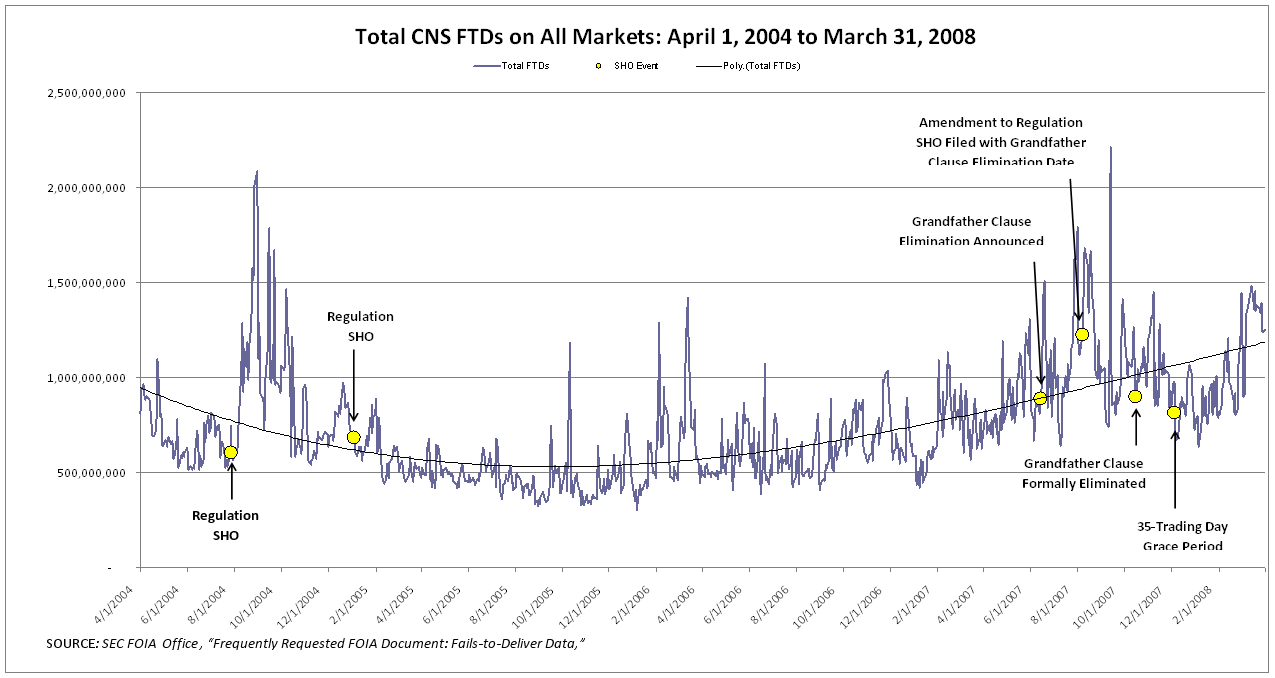Tuesday, July 07, 2009 11:39:35 PM
What if the reported DTC CNS metrics as publically reported in Reg Sho simply is a representation of the total short interest?
What if Ex Clearing (Trade Comparison) is responsible for allegedly up to 30 times the DTC CNS measures?
What if the only thing supporting our entire equity markets is the 'short interest'?
What if our SEC knows this to be fact hence our SEC cannot divulge the hedged abusers and their short interest portfolios____that knowledge of how FUBAR upside down our broker dealers are has FINRA literally shutting down the low price securites markets....
 _________________________________
_________________________________ Trade Comparison is the matching process through which the two parties to a brokerage transaction – the buy side and the sell side – agree on the key components of the securities transaction.
The key components of a securities trade are:
Side – Buy or Sell
Security – the specific issuer and financial instrument traded
Contra Broker – the firm with which the trade was executed
Quantity – the exact number of shares, bonds, options etc. traded
Price – the agreed upon execution price of the trade
Accrued Interest – the appropriate amount (BONDS ONLY)
At such time that both parties – buy side and sell side – agree on all key trade components, a trade comparison or contract results. A trade comparison or contract creates a legally binding securities transaction.
The trade comparison (matching) process is performed in one of two ways:
Electronically - through a designated clearing corporation or clearing house
Or
Manually - by the brokerage firm’s Purchase and Sales (P&S) Department.
The determination of whether or not a security is eligible for comparison through an electronic clearing house is made at the security level – that is, on a security by security basis. This classification is made by the individual clearing house. This classification is made based on a set of criteria that are selected by the particular clearing corp. Securities that are not eligible for the services of an electronic clearing house are compared Ex-Clearing.
Ex-Clearing Comparison
"Ex-Clearing" simply means that the trade comparison process is performed without the services of an electronic clearing house. Ex-Clearing is a manual comparison process that is performed by the brokerage firm’s Purchase and Sales Department when the traded security does not meet the eligibility standards of the designated clearing corp.
The Ex-Clearing clerk in the P&S Department sends or faxes a standard comparison form – a "Comp" – to the P&S Department of the contra broker. The standardization of the trade Comp is provided for under New York Stock Exchange Rule 101. Rule 101 requires firms to include the following trade details on all manual comparison forms:
Trade Date
Settlement Date
Security Traded
Quantity Traded
Transaction Price
Accrued Interest (Fixed Income Only)
Net or Settlement Dollar Amount
Due to standardization set forth under rule 101, the term "101" is used synonymously with Comp to refer to the manual comparison form. The result is a compared Ex-Clearing trade.
If the contra broker agrees with the specific trade details on the Comp, the Comp is signed and returned to the originating brokerage firm.
On settlement date, the firm’s Settlement area will create a Fail Record on the firm’s accounting books and records to represent the open receivable or deliverable. The Settlements department will ‘set-up’ a Fail-to-Deliver for securities sold to another firm, and a Fail-to-Receive for securities purchased from another firm.
The transaction is concluded when the selling firm delivers the sold securities to the buying firm, and the buying firm pays the selling firm for the delivered securities. At such time, the open fail record is removed from the firm’s books and records. The ultimate removal of the open receivable or deliverable is referred to as a "Clean-Up".
If the contra broker does not agree with the specific trade details on the trade Comp, the contra broker will "DK" the Comp. DK is a brokerage industry acronym that stands for "Don’t Know". Upon receiving a DK notice, the P&S Department must refer the item back to the originating trader for investigation and resolution.
The Role of the Clearing House
The sheer volume of securities transactions necessitates the use of Industry designated clearing organizations to facilitate the trade comparison process. The primary clearing organization for all US Domestic Securities transactions – US Security traded on a US Exchange or Market – is the National Securities Clearing Corporation – NSCC. The NSCC provides comparison services for US Equities, Corporate Bonds, Municipal Bonds and Unit Investment Trusts.
The NSCC also provides trade submission and clearing services for Mutual Funds.
Other Clearing Organizations include - but are not limited to - the Government Securities Clearing Corp – GSCC, the Mortgage Backed Securities Clearing Corp – MBSCC, the Options Clearing Corp – OCC and the International Securities Clearing Corp – ISCC. Each provides services similar to NSCC for its respective financial products and constituents.
The NSCC receives trade details from all major US Brokerage Firms and Clearing Companies, performs matching on all key trade elements, and generates trade comparison reports and output files.
The trade comparison reports generated by the NSCC provide details to the broker/dealer for both successful and unsuccessful trade record matches.
Successful matches on a specific trade record result when both the buy side firm and the sell side firm submit matching trade records to NSCC. The successful match results in a trade comparison or trade contract.
Unsuccessful matching results in either an Uncompared Trade or a Trade Advisory. Both occur when only one side (buyer or seller) submits its trade record for a particular transaction.
Uncompared Trade-
An Uncompared Trade results when a broker/dealer’s submits a trade record to a clearing organization for which no corresponding trade record exists. That is, the clearing corp. could not match the trade against any other trade records.
Trade Advisory-
When a brokerage firm submits a trade to the clearing house that does not match submission from the indicated contra firm – the submitting firm receives an uncompared trade. The contra broker indicated on that trade receives a Trade Advisory. The Trade Advisory alerts the non-submitting firm to the existence of a potential trade.
Simply stated, a Trade Advisory is the other side of an Uncompared Trade. One firm’s Uncompared Buy Trade is another firm’s Sell Advisory, and visa versa.
For Example:
Firm A submits the following trade records to NSCC:
BUY 100 IBM @ 124 ½ FROM FRIM B
SELL 50 T @ 56 3/8 TO FIRM B
BUY 200 AOL @ 68 11/66 FROM FIRM B
Firm B submits the following trade records to NSCC:
SELL 100 IBM @ 124 ½ TO FIRM A
BUY 50 T @ 57 FROM FIRM A
The following output is generated by NSCC:
Firm A:
COMPARED BUY 100 IBM @ 124 ½ CONTRA FIRM B
UNCOMPARED SELL 50 T @ 56 3/8 CONTRA FIRM B
ADVISORY SELL 50 T @ 57 CONTRA FIRM B
UNCOMPARED BUY 200 AOL @ 68 11/16 CONTRA FIRM B
Firm B:
COMPARED SELL 100 IBM @ 124 ½ CONTRA FIRM A
ADVISORY BUY 50 T @ 56 3/8 CONTRA FIRM A
UNCOMPARED BUY 50 T @ 57 CONTRA FIRM A
ADVISORY SELL 200 AOL @ 68 11/16 CONTRA FIRM A
The firm’s P&S Department is responsible for reconciling any differences resulting from the matching process.
Once the clearing corp’s matching process is completed, the trade comparisons are input to the trade settlement system for processing.
Trade Settlement
Trade Settlement is the ultimate exchange of securities and money between the two parties involved in the securities transaction. The majority of US domestic securities trades are settled via Continuous Net Settlement – CNS. The remainder of US domestic trades and the majority of International trades are settled on a trade-for-trade basis via physical delivery of physical (paper) certificates or through an electronic depository such as DTC – The Depository Trust Company.
Trade Settlement is accomplished on either a trade-for-trade basis or via net settlement.
Part I of this trade settlement discussion will focus on the movement of securities between trading partners, both manually and with the assistance of automated trade clearing systems.
Part II of this discussion will address the movement of funds associated with the trade settlement process.
FEATURED North Bay Resources Announces Production of Gold Concentrate and Refinery Shipment at Bishop Gold Mill, California • Nov 18, 2024 9:00 AM
One World Products Sets New Standards in Sustainability With Strategic Hemp Innovations • OWPC • Nov 18, 2024 7:54 AM
Kona Gold Beverage, Inc. Updates Multi-Million Dollar Merger and Posts Over $1.2 Million in Q3 Revenues • KGKG • Nov 15, 2024 10:36 AM
HealthLynked Corp. Announces Third Quarter and Year-to-Date 2024 Results with Strategic Restructuring, Third-Party Debt Repayment, and Core Technology Focus • HLYK • Nov 15, 2024 8:00 AM
Alliance Creative Group (ACGX) Releases Q3 2024 Financial and Disclosure Report with an increase of over 100% in Net Income for 1st 9 months of 2024 vs 2023 • ACGX • Nov 14, 2024 8:30 AM
Unitronix Corp. Publishes Its Cryptocurrency Portfolio Strategy • UTRX • Nov 14, 2024 8:05 AM









